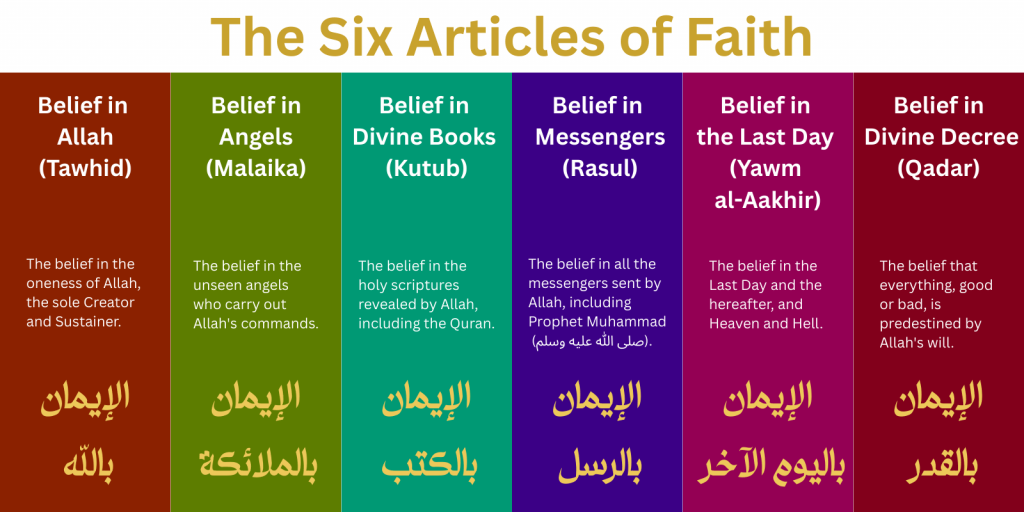The Six Articles of Faith in Islam
Core Muslim beliefs
One of the most famous sayings of the Prophet Muhammad ﷺ is known as the Hadith of Jibril (Gabriel). In it, the angel Gabriel came in the form of a man, sat with the Prophet in front of his companions, and asked him about Islam, faith, and spirituality.
When he asked, “What is faith?”, the Prophet replied:
“It is to believe in Allah, His angels, His books, His messengers, the Last Day, and to believe in divine destiny, both the good and the bad of it.”
(Narrated in Sahih Muslim)
This was the same Gabriel who had delivered God’s message to earlier prophets like Moses and Jesus – also known in Islam as the Holy Spirit (Ruh al-Qudus) and Jibril in Arabic.
Gabriel brought the Qur’an to Muhammad ﷺ, completing the line of divine guidance given throughout history.
These six beliefs — called the Six Articles of Faith — form the foundation of a Muslim’s understanding of life, God, and the unseen world. These are called the Six Articles of Faith (Arabic: ʿAqāʾid al-ʾĪmān).

Credit: Darussalam Education Centre
1. Belief in one God [Allah] (Tawheed)
Muslims believe in one, unique, eternal God who is the sole creator, sustainer, and ruler of the universe.
He has no partner, no children, and is not part of a Trinity.
“Say: He is Allah, the One and Only. Allah, the Eternal, Absolute. He begets not, nor is He begotten. And there is none like unto Him.”
— Qur’an 112:1–4
Islam teaches that God is both infinitely powerful and intimately close — nearer than your own heartbeat.
Islam did not begin with Prophet Muhammad ﷺ. Rather, it is the original faith of all prophets, including Adam, Noah, Abraham, Moses, and Jesus.
The Torah and Bible also affirm the oneness of God:
“Hear, O Israel: The Lord our God, the Lord is One.” — Deuteronomy 6:4
“…My Father is greater than I.” — John 14:28
2. Belief in the Angels (Malaikah)
Muslims believe in angels — unseen beings created by God from light.
They do not have free will and only obey God’s commands.
Every person has four angels with them at all times:
Two guardian angels, one in front and one behind, protecting them from harm.
Two recording angels:
🖊 The angel on the right records all good deeds and intentions.
🖋 The angel on the left records bad actions and sinful thoughts.
The chief of the angels is Gabriel (Jibril) — known also as The Holy Spirit in Islam. He delivered revelation to the prophets and brought the news of Jesus’ miraculous birth to Mary (Maryam), who is the most revered woman in Islam and has a full chapter in the Qur’an named after her.
3. Belief in the Revealed Books
God has sent guidance to humanity through revealed scriptures. Muslims believe in all original revelations, including:
📜 Suhuf Ibrahim — Scrolls of Abraham
📜 Tawrah — Torah of Moses
📜 Zabur — Psalms of David
📜 Injeel — Gospel of Jesus (not the New Testament)
📖 Qur’an — Final revelation to Prophet Muhammad ﷺ
The Qur’an is the only scripture that remains in its original language and wording, preserved for over 1,400 years without change.
🔍 Clarifying the Injeel: Muslims believe Jesus (Isa) received divine revelation, but the Bible today is a biography written after his time. While it contains some echoes of truth, it is not the original Gospel (Injeel) revealed to Jesus. Even the Bible itself acknowledges Jesus preached a gospel distinct from what was later compiled.
4. Belief in the Prophets (Nabuwwah)
God sent prophets to every nation throughout history with the same message: Worship the One True God and do good.
Muslims believe in all prophets, including:
Adam, Noah, Abraham, Moses, David, Solomon, Jesus, and finally,
Muhammad ﷺ, the Seal of the Prophets — who brought the final revelation.
All prophets are human — not divine — and were chosen to guide humanity, not to be worshipped.
“We make no distinction between any of them, and to Him we submit.”
— Qur’an 2:285
5. Belief in the Afterlife and Day of Judgment (Akhirah and Yawm al-Qiyamah)
Muslims believe that life does not end with death.
Everyone will be resurrected and held accountable for their beliefs and actions.
On this Day:
All hidden deeds, thoughts, and intentions will be revealed.
Each soul will stand before God for judgment.
Heaven (Paradise) and Hell are real, eternal destinations.
This belief gives life meaning and urges moral responsibility.
6. Belief in Divine Decree (Qadar)
Everything happens by the knowledge and will of God — both the good and the difficult.
God is never surprised. He knows the past, present, and future.
Muslims believe that free will and divine decree coexist:
We have the freedom to choose our actions, but God already knows what we will choose and how everything fits into His perfect plan.
This belief provides comfort and humility — especially during trials.
Why It Matters
These beliefs help Muslims:
✅ Understand their purpose in life
✅ Live with accountability and hope
✅ Feel connected to a long chain of prophets and revelation
✅ Trust God’s plan, even in hardship
Last edited:
Saad Dastagir
[email protected]
08/08/2025
